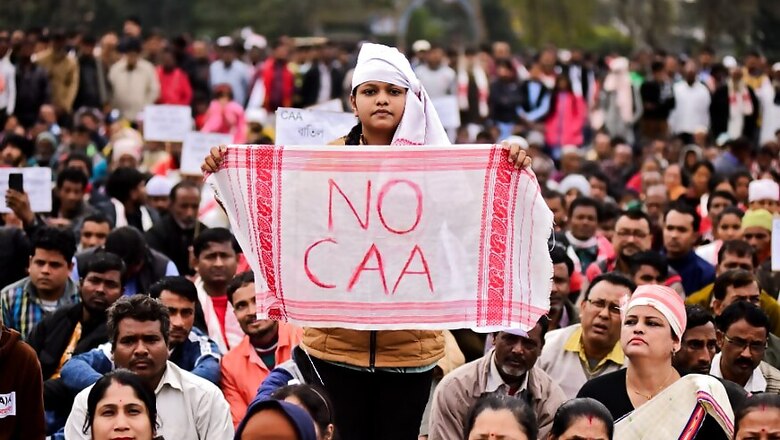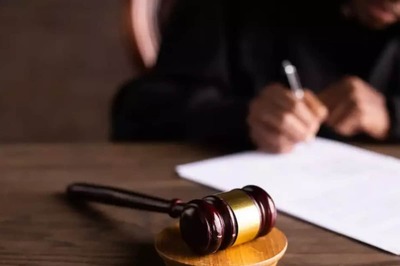
views
Amid the Covid-19 pandemic, a new regional political front is taking shape in the northeastern state of Assam where assembly elections are due next year. Once a powerful regional party, the Asom Gana Parishad (AGP) — now part of the Bharatiya Janata Party (BJP)-led coalition government —is fast losing ground. And there has been a demand from various quarters to fill this space, especially since the statewide protest against the controversial Citizenship (Amendment) Act, or CAA, last year.
Last month, six regional outfits formed an umbrella body called Anchalik Gana Morcha to take on the ruling BJP in the forthcoming polls. Among the most prominent faces on this front are veteran journalist-turned-Rajya Sabha member Ajit Kumar Bhuyan and Prodyut Bora, former BJP IT cell chief and leader of the Liberal Democratic Party (LDP).
“This time regional power will conquer Dispur by defeating BJP. We will put effort to form a bigger forum; however characteristics will be different from earlier regionalism. We have already sat for discussion with several regional bodies. Our prime focus is to appear as a regional power by uniting different bodies in one single platform,” Bhuyan, chief convener of the platform, told reporters in Guwahati.
While it is not clear whether this front will go for any alliance with mainstream political parties such as the Congress, it is likely to seek support from indigenous outfits including All Assam Students Union (AASU), Asom Jatiyatabadi Yuva Chatra Parishad (AJYCP) and Krishak Mukti Sangram Samiti (KMSS) which played a key role in the anti-CAA protests.
‘Faulty’ NRC, CAA Irked People
Assam, along with several other states, had witnessed massive protests, following the enactment of CAA, which grants citizenship to “persecuted” religious minorities from Bangladesh, Pakistan and Afghanistan who entered India on or before December 31, 2014. In Assam particularly, citizenship is a highly contentious issue linked to the six-year-long Assam Agitation, a movement against illegal immigrants by indigenous people of the state.
One of the highlights of the Assam Accord, a tripartite document signed at the end of the agitation in 1985 by the Centre, Assam government and leaders of the movement, was updating the National Register of Citizens (NRC). NRC is aimed at weeding out undocumented immigrants from neighbouring Bangladesh irrespective of their religion. While the successive governments kept dilly-dallying over the NRC, the BJP came to power in 2016 with a promise to implement it expeditiously.
However, what it did was a complete mess – the final list published on August 31, 2019 left out over 1.9 million names while including more than 31 million people, fuelling fears that a large number of “suspected” people had made it to the NRC. The state government is now exploring legal options for re-verification of names in the final list.
As if that were not enough, the BJP-led central government amended the citizenship law, which in essence, nullifies the very concept of NRC – the latter is a process to identify illegal immigrants while the CAA allows entry of immigrants on the basis of their religion.
The CAA also came in conflict with the BJP’s 2014 poll promise of addressing the issue of infiltration and illegal immigrants in the Northeast on a priority basis.
Regional Sentiments Take Root, Again
Ahead of the 2016 assembly elections, the BJP tried to fan regional sentiments by highlighting issues such as NRC, land rights of indigenous people, flood and erosion control, protecting socio-economic and political identity of indigenous Assamese Muslims, providing scheduled tribe status to six communities in Assam in a “strict time-bound manner”, among others.
Voters also put in their trust in the BJP in the absence of a credible alternative, as the only regional party, the AGP, which was born out of the Assam Agitation, was fighting for its survival. The BJP registered a massive victory securing 60 out 126 seats, while its allies AGP and Bodoland People’s Front bagged 14 and 12 seats respectively.
However, the new citizenship law came as a big disappointment, and sparked huge outrage in Assam. The people, especially the indigenous communities in the state, not only saw it as a big U-turn by the ruling BJP, but also as a betrayal by the AGP. So much so, AGP founder president and two-time chief minister Prafulla Kumar Mahanta openly denounced the party leaders who supported that CAA.
It was for the first time in 34 years that the entire state erupted in protest – people from all walks of life and all ages joined the peaceful rallies and processions. For the majority of the people in Assam, the CAA brought a sense of déjà vu.
Like in the time of the Assam Agitation, there was a groundswell of support for civil society organisations such as AASU, AJYCP and KMSS. Writers, activists, journalists and intellectuals also backed the idea that it’s time the state needed a strong regional party or a political forum, which could safeguard the state’s interests.


















Comments
0 comment